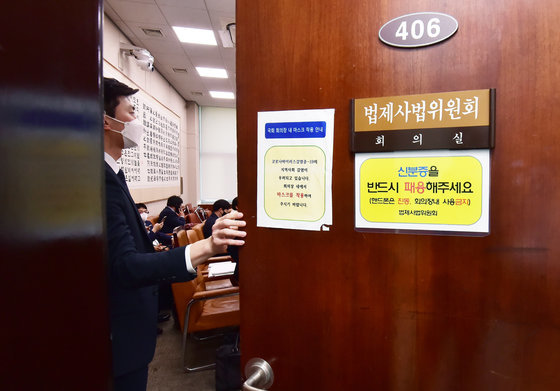Democratic Party focuses on passing multiple laws
Democratic Party focuses on passing multiple laws
Posted April. 21, 2022 08:07,
Updated April. 21, 2022 08:07

The Democratic Party of Korea has completed its preparation to pass a bill to deprive the prosecution of its function of investigation at the Legislation and Judiciary Committee of the National Assembly. And now it is expected to pass multiple laws in the provisional session of the National Assembly this month.
The Democratic Party, which took an extreme measure of its member Min Hyung-bae leaving the party on Wednesday, believes that passing the Agenda Coordination Committee and Legislation and Judiciary Committee won’t be too difficult. However, the bill needs to be brought into a regular session of the National Assembly to be legislated. The key variable is National Assembly Speaker Park Byeong-seug who emphasizes agreement between the ruling and opposition parties. Park refused to lay the Press Arbitration Act to a regular session last year due to the Democratic Party’s one-sided handling of the bill and faced criticism from hardliners. However, as the party is preparing for the bill to deprive the prosecution of its function of investigation with a firmer stance than last year, pressure on Park will be bigger. A member of the party said that it is a difficult situation for Park to refuse the introduction of the bill.
If the bill is presented to a regular session of the National Assembly, the People Power Party plans to block it with a filibuster. The Democratic Party is trying to secure 180 seats, which makes the party eligible to forcefully stop a filibuster. There is a total of 179 pro-Democratic Party seats, including the party’s 171 members, six independent members who used to be members of the party, including Park, and two members of the Transition Korea and the Basic Income Party. It seemed like 180 seats were secured as Rep. Kwon Eun-hee of the People’s Party said she agreed with the bill. However, as Rep. Cho Jung-hun of the Transition Korea opposed the bill by saying that he believes the agenda of prosecution reform is not a priority, the Democratic Party is facing an issue with its plan. The party will continue to convince six members of the Justice Party before a regular session.
If the party fails to nullify a filibuster, the last resort is to divide a session. As a filibuster is forcefully stopped when a session ends in accordance with the National Assembly Act, a provisional session can be divided into two to three sessions to pass bills. The Democratic Party plans to divide a session into a minimum of three to pass the revision bills of the Prosecutors’ Office Act and the Criminal Procedure Act. The party passed the revision bill of the Public Official Election Act and the Act on the Establishment and Operation of the Corruption Investigation Office for High-ranking Officials in 2020 using the method.
Dong-Jun Heo hungry@donga.com







